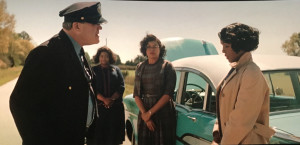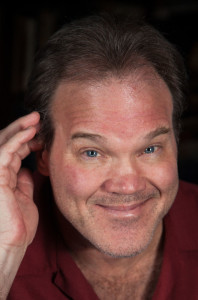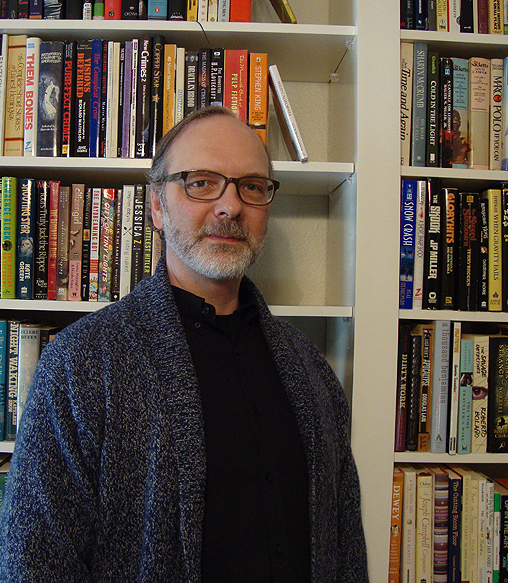“If you bore yourself, you bore others,” a comedian friend told me years ago. It was true of the very off the wall stand up we were doing at the time, and I’ve lived by it both as a writer and actor since. If what you’re doing isn’t breathing, throbbing, kicking, illuminating, practically exploding off the page and in your brain, what’s the point of doing it in the first place, and why would anyone want to watch or read it? It has to be alive. It has to inhale and exhale, with all of nature’s inherent flaws, warts, blemishes, massively beautiful imperfections that rub us all kinds of ways and remind us just how unbearably alive we are.
For this reason I’ve always been drawn to writers who shake the dust off of old tomes and bring a whirlwind through their writing, and the sun’s blinding glare. The kind of writing that lifts you, makes you see and feel, because you know damn well they do and they’re showing it to you, and not only do you not have trouble getting into it, you can’t get out of it, or get it out of your dreams. Long after you read it or see it it’s living in your brain like some seductive disease that carries you back from time to time to read it or watch it again. Ezra Pound said: “Good writing is news that stays news.” It doesn’t matter how many times you go back to it, it’s going to grab you, because it is alive.
I’d been writing for years when I wrote my novel Creature Storms. As I got into it I determined not to get in the way of what the characters thought, did, or said, regardless of what it was. I’m going to let them have their say, I thought, let them hang it all out there on the line, no matter how embarrassing or uncomfortable, how strange it sounds, how much it might reveal about me personally. This is the only chance they have to live, so don’t hold them back, don’t impose your morals or limits on them. If they are profane, crazy, odd, whoever they are, put them down word for word, don’t censor or edit them while it’s flowing. Let them have their life, in other words, and don’t judge it. Later on, in revision, if it’s too much, if you think they said too much, if they went too far, you can always pull it back then, tone it down, or even cut it, but at least to begin with let these people live.
But when I went back to it later, some of the boldest, wildest and out there things I’d written were the best things in the book. They were the raw stuff, they were all me and no one else: it was shockingly alive. I believe when we’re writing our best, most tapped in, subconscious work, we’re living where the essence of art is, and when I looked at scenes I’d written in an almost blind, visionary flurry, it was me, all right, but a part of me I hardly recognized; it was a revelation, which I believe is the primary purpose of art at its truest. Here was my own inimitable gift, my ability to open up some secret chakra and let the truth flow out in a manner that was almost scary, that hit me in places the way the best writers I’d read had hit me, the ones who’d inspired me to write to begin with. It was undeniably alive.
 The same principle applies as an actor. Writing and acting are linked and inseparable as art forms. They depend upon one another. You have to be blindly willing as an actor to let your guard down and never judge your characters while playing them, in the same way a writer cannot judge what is coming out of a character’s mouth on the written page. The best way, in fact, to write stilted, dull and lifeless prose, to tell a story no one cares about, or destroy a character in theater or film, is to judge them at all. When people coming through you are truly alive, they don’t belong to you, and if you want them to be at their most alive, don’t get in their way.
The same principle applies as an actor. Writing and acting are linked and inseparable as art forms. They depend upon one another. You have to be blindly willing as an actor to let your guard down and never judge your characters while playing them, in the same way a writer cannot judge what is coming out of a character’s mouth on the written page. The best way, in fact, to write stilted, dull and lifeless prose, to tell a story no one cares about, or destroy a character in theater or film, is to judge them at all. When people coming through you are truly alive, they don’t belong to you, and if you want them to be at their most alive, don’t get in their way.
When I was doing a play in my thirties, that was ripped from real life by a great playwright friend, she had all of the actors sit in a circle and run the scenes, talking to each other. “I don’t want you to just say the lines,” she said. “I want everything, everything you say to be from the heart: I want you to mean it. Don’t do it with facial expressions, body language, volume, or any other kind of indicating or tricks, I want you to look at her and believe what you say, feel it as if it’s the last belief you’ll ever have. We did, and it was remarkable. If she didn’t believe what we said, she’d stop us and say, “Do it again. Say it from your heart, not from your head.” And by the time we performed the play our audiences were spellbound, because it had taken on a life beyond theater. We weren’t acting. There was a hypnotic silence in the seats there would be in a real life dramatic scene between people if you happened to be trapped in a room with them. The audience had become flies on the wall in a happening. Actors can feel the audience when it’s working, as they can when it’s not working. If it’s not alive, if it’s not coming from some undeniable visceral place that is the source of all life, you can feel it from their eyes. This is a fraud, they say, and what are we doing here? But with this play you could feel their emotion coming back to you as if some spirit or being had entered the room. And that should be the goal of the artist, the actor and writer: to bring a spirit into any room, put it on the page, really make it matter: what William Faulkner called the “tinsel and thunder.” If it’s exciting you as you write it, it’s going to excite whoever’s reading it likely. If it’s not, you can be just as sure it will bore them to death. Sure, the exact word is golden, fine, and language is powerful in itself, but if it isn’t alive, the greatest linguists in the world can’t make it so.
In Hemingway’s A Moveable Feast he recounts a conversation between himself and another young writer in a Paris café about Dostoyevsky’s writing. Some of the writing’s so bad, so awful, so overwritten, but it’s so good, and there’s really no one better, he says. Which makes this great and tortured and afflicted 19th Century Russian writer one of the best in any language. Dostoyevsky’s writing is probably the most personally revealing of anyone in modern literature, and consequently the most alive. His characters confess their unbearable self doubt and self loathing, failures, humiliations, passions that make you cringe, fears and obsessions and failures, as well as joys, laying it all out there passionately, in speeches like floods that break your heart and scare you and tie you to his humanity and humility in a way that is jarring at times. Where you might be embarrassed for his revelations, he’s giving us flesh and blood unforgettable characters and life to a degree no one else has, except maybe Shakespeare. His work is more alive a hundred and fifty years later than most writers’ today, because he held nothing back, and wrote it in a headlong rush and avalanche of blinding and purifying confession. Time and culture and manners haven’t toned it down or tamed it, it burns off the page, sweats, bleeds, cries, haunts your dreams much in the way Van Gogh’s paintings do. There is a similarity between Dostoyevsky’s writing and Van Gogh’s paintings: once you’ve seen them you’re never quite the same. They aren’t just representing life: they are alive.
So when choosing something to write about, make sure it matters enough to you to bring it to life. The poet and novelist, James Dickey, said if he had an idea that wouldn’t leave him alone, that kept eating at him, awake and in dreams, he knew there was a charge there that would create a good, maybe a great poem. If it won’t leave you alone, if you can’t shake it, no matter what it is, it’s yours to write, it chose you. And that’s the one to go after. And when you do, don’t inhibit it even a little bit because it may be too outlandish. If you have the impulse, if it speaks to you, put it down even if it seems farfetched at first. Decide that later, but in a first draft, when no one is watching but you, let it fly, give it freedom, don’t judge it or think about it with that critical, self-doubting part of your brain. Just say it, throw it out there to the Great Unknown. And when you go back to look at it, you may be surprised that some of the best writing you’ve ever done will be that unleashed, uncensored wild animal you sent bolting into the wilderness. Writing that is alive.
 Ron Clinton Smith is a writer of poems, stories, songs, novels, and screenplays, and an actor who appeared in such films and TV as We Are Marshall, The Mist, Parental Guidance, True Detective, and Hidden Figures. He began his acting career in standup comedy, moved to theater, and later to film and television. In 2012 he published the literary novel, Creature Storms. His story, “A Pilgrimage to Dennis Hopper,” first appeared in the River Teeth Journal of Narrative Nonfiction, was nominated for the Pushcart Prize, and was listed as one of the most notable essays in Best American Essays, 2015. He’s published stories in Upstreet Magazine, Novella T, 2 Bridges Review, and Zoetic Press/NonBinary Review. He balances his time between writing and film acting.
Ron Clinton Smith is a writer of poems, stories, songs, novels, and screenplays, and an actor who appeared in such films and TV as We Are Marshall, The Mist, Parental Guidance, True Detective, and Hidden Figures. He began his acting career in standup comedy, moved to theater, and later to film and television. In 2012 he published the literary novel, Creature Storms. His story, “A Pilgrimage to Dennis Hopper,” first appeared in the River Teeth Journal of Narrative Nonfiction, was nominated for the Pushcart Prize, and was listed as one of the most notable essays in Best American Essays, 2015. He’s published stories in Upstreet Magazine, Novella T, 2 Bridges Review, and Zoetic Press/NonBinary Review. He balances his time between writing and film acting.




This speaks to me: “So when choosing something to write about, make sure it matters enough to you to bring it to life. The poet and novelist, James Dickey, said if he had an idea that wouldn’t leave him alone, that kept eating at him, awake and in dreams, he knew there was a charge there that would create a good, maybe a great poem. If it won’t leave you alone, if you can’t shake it, no matter what it is, it’s yours to write, it chose you. And that’s the one to go after. And when you do, don’t inhibit it even a little bit because it may be too outlandish.”